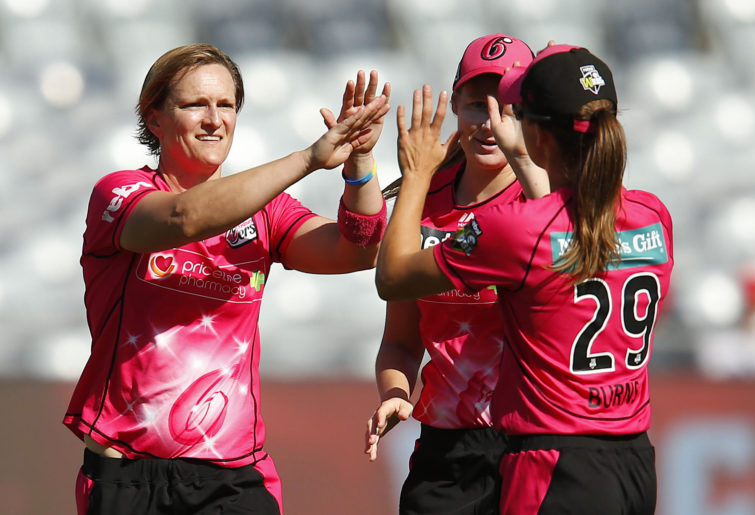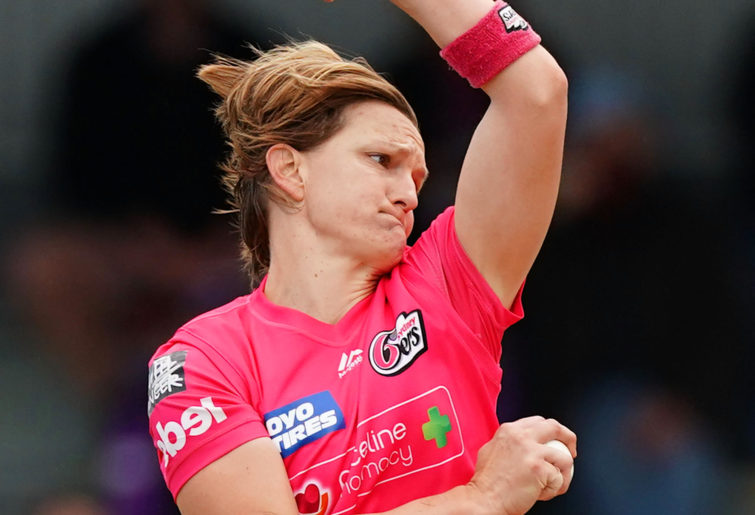Can't beat the Heat! Neser's relay catch stunner sums up brilliant Brisbane's second BBL title as Sixers smashed
Brisbane have claimed their first Big Bash League title in 11 years after their band of late bloomers lifted the Heat to a 54-run…
Opinion
We are now past the halfway point of WBBL|05 and most things have gone to plan. The Sydney Sixers are sitting in third position with six wins and four losses.
Some of the highlights of those wins were the two wins over our cross-town rivals the Sydney Thunder and a record first wicket partnership of 199 by Alyssa Healy and Ellyse Perry over in Perth against the Melbourne Stars.
During that innings, in my typical stupid cricket superstitious style, I stayed standing upstairs in the changerooms, in full playing kit from the first ball of our batting innings until the very last ball. I was only allowed to move away from the position at the end of an over and couldn’t go and sit with my teammates down on the ground in the team dugout just in case we lost a wicket.
I couldn’t upset the cricket juju! If I did move from that position and we lost a wicket it would have been my fault – this is how some cricketers’ brains work when there is a match on. Unfortunately, it is something that you grow into believing is a real thing.

(Photo by Darrian Traynor/Getty Images)
While the wins are always good to talk about and celebrate, the losses are hard to take – and some more than others. And they also should be spoken about. The Sixers and the Melbourne Renegades have had many tight tussles over the past two or three campaigns. The semi-final of WBBL|04 was a classic – a tie after the final ball of the Renegades innings to take it to a Super Over.
This season, we defeated them with one ball remaining and only four wickets in hand in Perth only a few weeks ago. Then on Sunday, we produced another nailbiter.
We batted first at Drummoyne Oval in Sydney and got our way to 139 off the 20 overs, mostly off Marizanne Kapp’s bat, who scored 52 not out. We were confident that our attack would be able to defend that total, despite being without our other South African star, Dane van Niekerk, after she sliced her hand open cutting an avocado the night before the game – it just goes to show the Simpsons were right once again: you don’t make friends with salad!
The Renegades got off to a great start with their English international Danni Wyatt scoring a rapid 55. With six overs to go they were on track needing seven runs an over with six wickets in hand.
When we dismissed Wyatt in the 15th over, we started to get a bit of a roll on; the next four overs went for only 14 runs.
Off the last two overs with three wickets now in hand, the Renegades required 28 runs. I was thrown the ball for the penultimate over – the goal was to limit the runs off the over and put it out of reach before the 20th. That was the plan anyway. One of my previous overs had gone for 14 runs, including five wides off the one ball. The first of this over went for six. Two balls later a four. In total, it cost 13.

(AAP Image/Scott Barbour)
It left the Renegades with 15 runs off the final over. They were still in with a sniff, even with one of the world’s best death bowlers, Kapp, to bowl the final over. We knew we could defend it and take the two competition points.
The Renegades had other ideas.
It’s always the way that when it’s not your day, the ball seems to follow you. Second delivery of the over, a well-struck ball came to me in the deep and a misjudgement due to a strong wind saw me drop the catch and give up two runs. The next ball went for four when two of our fielders failed to communicate.
Seven off three balls. A run-out on the fourth ball meant they needed seven off the final two. Two runs out to the deep and it came down to the last delivery – four to tie once again or five to win. A well-struck shot sailed over the rope for six and the Renegades won the match.
A brilliant win for the Renegades. A heartbreaking loss for the Sixers.
When you fight your way back into the game several times and then get beaten on the last ball, you start to reflect on your own personal performance and where it all went wrong. You sit there in the changerooms with your own thoughts, trying to comprehend what just happened, with other players doing the same. But not long after you’re given a sharpie and head out to sign autographs for the fantastic fans. After a loss it’s hard but they are always so happy to see you and have a chat.
After this game, I was still in my head and not engaging much with those I was signing stuff for. People said what a great game everyone had and “well bowled” and the whole time I was thinking “did you actually see what just happened? I was horrible. I lost us the game!”
These thoughts fester away in your mind and you analyse all the moments you believe lost the game. I have a pretty long drive home and when you’re in the car for over an hour and a half, they become all-consuming.
All I thought about were my two massive overs that went for 27, the five wides and, of course, the dropped catch in the last over that would have seen Courtney Webb, who hit the last ball for six, back in the sheds.
When all of these things are going through your head and you are blaming yourself for a loss, a good night’s sleep is never going to happen – and it didn’t on Sunday.
The next day on my way up to Sydney to go to work – something that certainly brings you back down to earth after wins, but makes you want to close the office door after losses – all of those thoughts were still going through my head. Festering away. Eating away at confidence. I found myself being really short and snapping at some colleagues at work, which is very unlike me, especially when I haven’t seen them in a while.
I messaged our coach, Ben Sawyer, and told him that I wanted to take the blame for the loss. I needed to get it off my chest. Whether it was right or wrong, it didn’t matter to me. I wanted to own my mistakes and ultimately learn from them.
I have no doubt some teammates would have run through moments they were involved in and had similar thoughts. Some dwell on them and others acknowledge them and move on quickly.
Even if you dwell on it, it’s equally important for it to be acknowledged so you can learn from it. Players won’t improve otherwise. Festering negativity is an athlete’s worst nightmare, but there are also times when you just have to applaud the opposition for being better than you on the day.
There has lately been a lot of reporting around about the mental health of cricketers and athletes in general. A lot of what happens in sport is a reflection of broader society. Those that are brave enough to speak out and acknowledge that they struggle with their mental health will be stronger for it. And you don’t have to be an athlete to speak up.